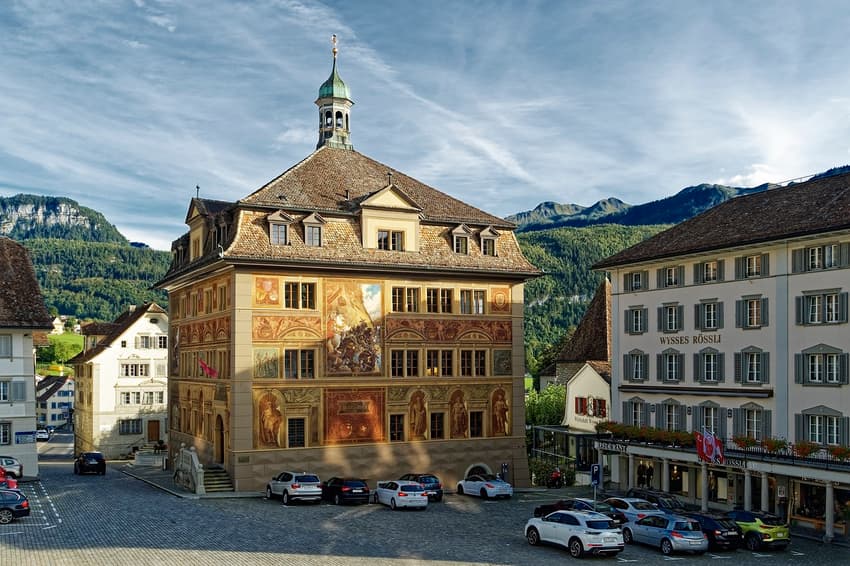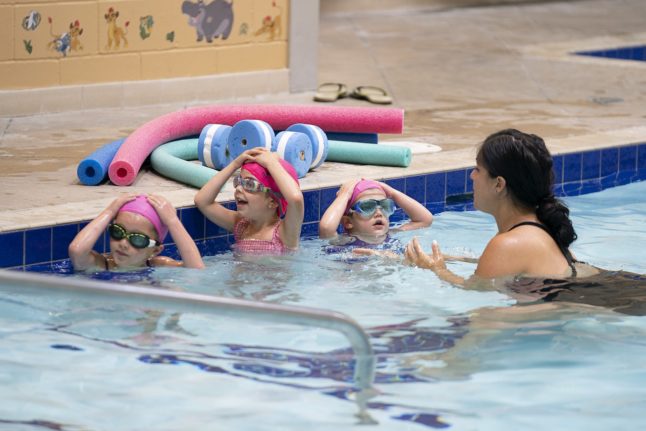Cows’ hair and swimming lessons: The 8 weirdest Swiss citizenship exam questions

When it comes to its citizenship criteria for foreign residents, Switzerland’s are among the toughest in Europe. And some of the questions asked by municipal naturalisation committees don’t make the process any easier.
Volumes have been written, including by The Local, about the often-bizarre questions that candidates for naturalisation must answer to prove their suitability to be called ‘Swiss.’
These questions come from communes where the candidates live — the most important decision-makers of the three-tier naturalisation procedure, which includes federal, cantonal, and municipal level.
READ ALSO: Why do Swiss communes play such an important role in the naturalisation process?
Specifically, these questions were culled from actual exams given to candidates by various municipalities in canton Schwyz.
Now, you may think that the mostly rural canton is not exactly a trendsetter in matters of citizenship — or anything else, for that matter.
That’s because you may not know that (at least party because of its proximity to Zurich as well as one of the lowest tax rates in the country), over 22 percent of the canton’s residents are foreign nationals.
And Schwyz is in eighth place nationally in terms of growth of its foreign population.
In fact, Switzerland’s richest individual, German national Klaus-Michael Kühne, whose wealth is estimated at 41 billion francs, lives in Schwyz.
While given his fiscal importance to the canton Kühne would likely not have any problems getting a Swiss citizenship if he ever decided to do so, foreigners who are not as well-heeled must answer some truly weird questions.
From zoo to wrestling
A local Schwyz newspaper, Freier Schweizer, compiled a list of naturalisation questions from all 30 of the canton’s municipalities.
They are designed to find out how much the applicants know about their communes and, therefore, how integrated they are into local life.
Here are some of them:
Do you know what colour most of the cows in [Schwyz’s] Muota Valley are?
Whether by accident or design, this is a trick question because, according to Barbara von Rütte, an attorney at the Europa Institute of the University of Basel “there is no clearly correct answer to such question".
Can you name two animal species that live in Goldau Zoo?
This can only be answered if you visit the local zoo and take copious notes.
If you don’t go to the zoo, however — for instance, because you don’t like to see animals in cages — you can forget about a Swiss passport, as one foreign national (also a resident of Schwyz) found out:
READ ALSO: How an Italian man's lack of zoo animal knowledge cost him Swiss citizenship
There is no king in Switzerland, except in a typically Swiss sport. Which?
The answer is Schwingen, a type of Swiss wrestling.
In all fairness, this is not an unreasonable question (certainly less so than the one about the colour of cows) because it shows familiarity with traditions that are typically Swiss.

What colour are you? Photo: Pixabay
Do you think there should be more immigration to Switzerland?
Hmm, this is clearly a question that candidates can’t answer without shooting themselves in the foot.
If you are against the influx of foreigners, then what are you doing in Switzerland in the first place?
If you are for it, this means you can’t be truly ‘Swiss.’
What is an Oberallmiger?
We pity the poor candidate who is expected to know an answer to this question.
We Googled this word far and wide and have not found the answer.
What is the Oberiberger Guggenmusik called?
‘Guggenmusik’ is a general term for the kind of music costumed marching bands play during carnivals in Switzerland.
This particular question clearly refers to the kind of Guggenmusic performed during a carnival in the Schwyz village of Oberiberg (we are guessing, of course).
What exactly this particular music from this particular location is called requires insider knowledge, however.
What is a Ländler?
It is a traditional dance that originated in Schwyz.
We assume a candidate for naturalisation doesn’t have to demonstrate this dance to be approved.
Does your child take swimming lessons?
This may be a legitimate question in all other circumstances, except on a citizenship test.
Why?
If you have a daughter who doesn’t participate in compulsory swimming lessons at school, Swiss authorities will likely take this to mean you are a Muslim who doesn’t believe in gender equality.
There was actually such case in 2017, when a Turkish couple in Basel refused to allow their two daughters to attend school swimming lessons, because boys participated in them as well.
The case caused quite a stir, with the couple petitioning Switzerland’s federal court to intervene, claiming the school violated their right to religious freedom.
The court, however, ruled against the parents, saying school activities, including swimming lessons, "play a special role in the process of social integration, particularly where children of foreign origin were concerned.
Swimming lessons are "not just to learn to swim, but above all to take part in that activity with all the other pupils", it added.

Swimming lessons are obligatory. Image by Makalu from Pixabay
What do experts say?
Some of the above-mentioned questions “have no place in the naturalisation process", von Rütte said.
“This is not a specialist exam,” she added. “It shouldn't ask for more than could reasonably be expected from an average Swiss resident in the community."
Comments
See Also
Volumes have been written, including by The Local, about the often-bizarre questions that candidates for naturalisation must answer to prove their suitability to be called ‘Swiss.’
These questions come from communes where the candidates live — the most important decision-makers of the three-tier naturalisation procedure, which includes federal, cantonal, and municipal level.
READ ALSO: Why do Swiss communes play such an important role in the naturalisation process?
Specifically, these questions were culled from actual exams given to candidates by various municipalities in canton Schwyz.
Now, you may think that the mostly rural canton is not exactly a trendsetter in matters of citizenship — or anything else, for that matter.
That’s because you may not know that (at least party because of its proximity to Zurich as well as one of the lowest tax rates in the country), over 22 percent of the canton’s residents are foreign nationals.
And Schwyz is in eighth place nationally in terms of growth of its foreign population.
In fact, Switzerland’s richest individual, German national Klaus-Michael Kühne, whose wealth is estimated at 41 billion francs, lives in Schwyz.
While given his fiscal importance to the canton Kühne would likely not have any problems getting a Swiss citizenship if he ever decided to do so, foreigners who are not as well-heeled must answer some truly weird questions.
From zoo to wrestling
A local Schwyz newspaper, Freier Schweizer, compiled a list of naturalisation questions from all 30 of the canton’s municipalities.
They are designed to find out how much the applicants know about their communes and, therefore, how integrated they are into local life.
Here are some of them:
Do you know what colour most of the cows in [Schwyz’s] Muota Valley are?
Whether by accident or design, this is a trick question because, according to Barbara von Rütte, an attorney at the Europa Institute of the University of Basel “there is no clearly correct answer to such question".
Can you name two animal species that live in Goldau Zoo?
This can only be answered if you visit the local zoo and take copious notes.
If you don’t go to the zoo, however — for instance, because you don’t like to see animals in cages — you can forget about a Swiss passport, as one foreign national (also a resident of Schwyz) found out:
READ ALSO: How an Italian man's lack of zoo animal knowledge cost him Swiss citizenship
There is no king in Switzerland, except in a typically Swiss sport. Which?
The answer is Schwingen, a type of Swiss wrestling.
In all fairness, this is not an unreasonable question (certainly less so than the one about the colour of cows) because it shows familiarity with traditions that are typically Swiss.

Do you think there should be more immigration to Switzerland?
Hmm, this is clearly a question that candidates can’t answer without shooting themselves in the foot.
If you are against the influx of foreigners, then what are you doing in Switzerland in the first place?
If you are for it, this means you can’t be truly ‘Swiss.’
What is an Oberallmiger?
We pity the poor candidate who is expected to know an answer to this question.
We Googled this word far and wide and have not found the answer.
What is the Oberiberger Guggenmusik called?
‘Guggenmusik’ is a general term for the kind of music costumed marching bands play during carnivals in Switzerland.
This particular question clearly refers to the kind of Guggenmusic performed during a carnival in the Schwyz village of Oberiberg (we are guessing, of course).
What exactly this particular music from this particular location is called requires insider knowledge, however.
What is a Ländler?
It is a traditional dance that originated in Schwyz.
We assume a candidate for naturalisation doesn’t have to demonstrate this dance to be approved.
Does your child take swimming lessons?
This may be a legitimate question in all other circumstances, except on a citizenship test.
Why?
If you have a daughter who doesn’t participate in compulsory swimming lessons at school, Swiss authorities will likely take this to mean you are a Muslim who doesn’t believe in gender equality.
There was actually such case in 2017, when a Turkish couple in Basel refused to allow their two daughters to attend school swimming lessons, because boys participated in them as well.
The case caused quite a stir, with the couple petitioning Switzerland’s federal court to intervene, claiming the school violated their right to religious freedom.
The court, however, ruled against the parents, saying school activities, including swimming lessons, "play a special role in the process of social integration, particularly where children of foreign origin were concerned.
Swimming lessons are "not just to learn to swim, but above all to take part in that activity with all the other pupils", it added.

What do experts say?
Some of the above-mentioned questions “have no place in the naturalisation process", von Rütte said.
“This is not a specialist exam,” she added. “It shouldn't ask for more than could reasonably be expected from an average Swiss resident in the community."
Join the conversation in our comments section below. Share your own views and experience and if you have a question or suggestion for our journalists then email us at [email protected].
Please keep comments civil, constructive and on topic – and make sure to read our terms of use before getting involved.
Please log in here to leave a comment.